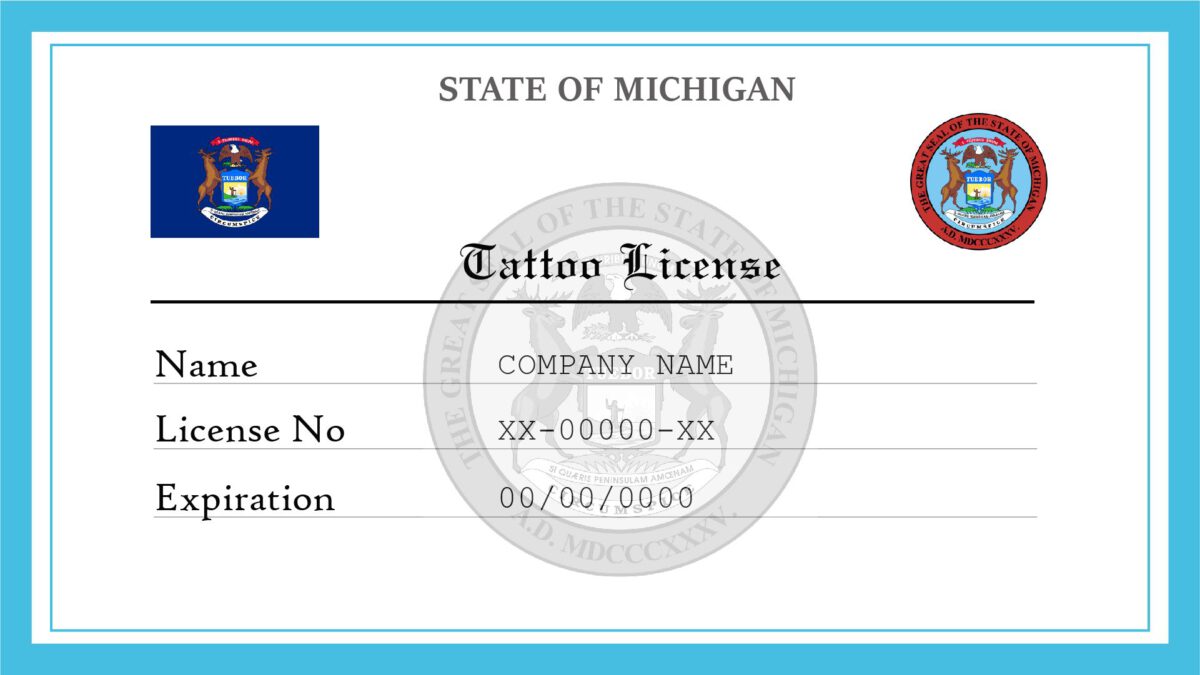If you’re planning to pursue a career as a body artist, you must familiarize yourself with the Michigan tattoo license requirements. This process is highly regulated by the local government, similar to other health-related fields like cosmetology or nursing. In this blog post, we will outline the steps required to obtain a permit, empowering you to confidently embark on your career journey.
Table of Contents
ToggleMain Terminology Explained
Before delving into the core of today’s discussion, let’s familiarize ourselves with some relevant terminology. According to Public Act 375, “body art” refers to tattooing, branding, and body piercing, excluding ear piercing. Professionals can only perform these activities in a designated “body art facility.” The facility must apply for a Michigan tattoo license.
How to Get a License to Tattoo?
To streamline the process, here’s a comprehensive list of requirements for Body Art Facilities. We’ll focus on the key points:
The tattooing profession is closely associated with public health. Consequently, local health departments play a crucial role in ensuring compliance with regulatory rules. You should be prepared for possible inspections by familiarizing yourself with the inspection report. It’s important to note that inspection criteria may vary based on two factors:
- Whether you are the owner or operator of a Michigan-licensed organization.
- Whether you are the owner or operator of an out-of-state organization.
Fees for Obtaining a Michigan Tattoo License
Public Act 375 also outlines the non-refundable fees that facilities must pay to obtain a permit to operate in this industry. The fee structure is as follows:
- If an organization applies before July 1, the document will cost $500.00, subject to the current consumer price index.
- If an organization applies on or after July 1, the document will cost $250.00, without considering the current consumer price index.
- For permit renewals beginning October 1 (the start of the fiscal year), the fee is $500.00 (plus the consumer price index).
- If the renewal occurs after December 1, an additional $250.00 is charged.
Please note that local fees may also apply, so it’s essential to check the relevant governmental websites for accurate information.
Employee Requirements
One of the advantages of being a tattoo artist is that you don’t need an individual license to work. However, employers must undergo sterilization training. All technicians must be at least 18 years old and possess knowledge of disease prevention, control, and first aid. It’s not enough to have theoretical knowledge; specialists must also be able to implement these skills in practice.
Physical Facility Requirements
The tattoo studio must be clean and comfortable for both employees and clients. It should have separate areas for different activities such as sketching, eating, and resting. Additionally, an autoclave is mandatory on the premises for sterilization purposes. All equipment that comes into contact with the skin must be disposable or sterilized.
Furthermore, the workspace should be equipped with essential first aid items such as gloves and bandages to ensure the safety of both visitors and employees. By adhering to these guidelines, obtaining official authorization in Michigan shouldn’t be a problem.
Frequently Asked Questions
Q: How long does it take to obtain a Michigan tattoo license?
A: The processing time may vary, but it typically takes a few weeks to a couple of months to receive your license. Factors such as completeness of documentation and the workload of the regulatory authorities can impact the processing duration.
Q: Are there any additional requirements for tattoo artists in Michigan?
A: Apart from meeting the licensing requirements, tattoo artists in Michigan must comply with all applicable health and safety regulations. It is essential to stay updated with any changes in the industry and maintain proper hygiene practices to ensure the well-being of both artists and clients.
Q: Can I work as a tattoo artist in Michigan without a license?
A: No, it is illegal to provide tattoo services without a valid license in Michigan. Working without a license can lead to legal consequences, including fines and the closure of your business. It is crucial to complete the necessary steps and obtain the required license before commencing any tattooing activities.
Conclusion
Becoming a licensed tattoo artist in Michigan requires adhering to specific regulations and procedures. By understanding the Michigan tattoo license requirements, you can confidently navigate the process and launch your career in this exciting industry. Remember to prioritize public health and safety, equip yourself with the necessary knowledge and skills, and maintain a clean and comfortable workspace. Good luck on your artistic journey!






